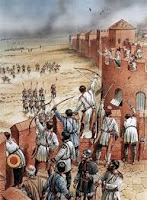Prafulla Kumar Mohanty
The first consciousness of woman
was that she was made out of a supernumerary bone of Adam's ribs; she was the
other without any authenticity of her own. This
definitely has caused a silent psychic rebellion in woman. When she referred
to herself, after the title of Simone de Beauvoir's path breaking book Second
Sex, she became more conscious of her secondary status in nature's scheme of things. The
reproductory process makes the woman more conscious of her place which is, if
not, subservient or secondary, at least that of a vassal to carry someone's seed and give birth
to a child without having the right of ownership. In the Indian context the
woman was given a separate role, the role of what we call today, a homemaker.
But the idea behind it was definitely quite imaginative. When men and women
moved from nature to culture, the woman was given a role of a grihalaxmi, the
deity of the house- home, she would make it beautiful, hospitable and a
self-sustaining world. But in practice she was
a womb, a slave without any say in decision making. She should be
obedient and responsible for the order
in the home. Only in those rare cases where love enriched life she had at least
the identity of a sweet life -partner, a separate person who could absorb the
man in body and mind. But this was rare, few and far between .
But the rigour of patriarchy
became somewhat soft when Bernard Shaw ( Candida) and Ibsen ( A Doll's House)
and other writers gave the woman a
separate thinking mind. Candida and Nora had to fight for identity although the
losses were irreparable. Education and the suffragette movement gave the woman
a sense of liberation. She sub-consciously adhered to the idea that a
woman is not born, she becomes a woman, a Beauvoir assertion which gained
currency. The European theatre had some changes in the backdrop and wings. But
liberation came around the 30s of the 20th century.
But in India the scene began to
change only after the Independence. The rigidity of religious rituals , superstitions,
the gender bias and suppression gradually slackened after education at par with
the West began in Urban Centres. Woman started speaking in public and also
started writing in English. Toru Dutta, Sarojini Naidu and others were the pioneers.
The local languages too got a big boost when English masterpieces were
available even to the middle class readers. But till date a large population in
India is tradition bound and superstitious as the light of modern education has
not yet dispelled the darker regions of Indian mind. Women are still repressed
and do not have their voice to speak and write. The local languages have a few
women writers but no one dares to write her true feelings. Yes many talented
writers are now openly voicing their
feelings. Mahasweta Devi, Kamala Das, de
Souza and Silgardo and many others have led the foundation of women writing in
India not to speak of Booker winner Arundhati Roy.
In the context of Odisha the women
writers are now getting into prominence. After Kuntala Kumari Sabata who for
the first time made us aware of a feminine psyche, today we have Prativa Ray
whose novels and stories have retouched
the mythic past with a modern brush. Prativa transforms Draupadi and Ahalya into contemporary women of substance. Her women do not
transgress the accepted norms of inherited culture but they are sophisticated and refined. They
are not feminist rebels but are more
humanistic with an ethical core. Prativa Satapathy in her poetry gives free
rein to her native passions without sacrificing
the essential feminine. There are more than 50 women writers in Odisha who are now following
feministic footprints but they have not yet established the humane kind of feminism. But occasionally
there are sparks in their poems and stories which may turn into viable
conflagration.
But seldom we find in them a cosmic vision of pure womanhood. They project
woman as suave, spirited and free agents of the society. Archana Nayak, Mamata
Das, Sanghamitra and Aparna Mohanty are quite bold voices in Odia literature.
Aparna Mohanty, Prabasini Mahakuda, Ranjita Nayak try to project women as free and flamboyant in self-
pursuit. Aparna Mohanty even writes freely about feminine sexuality. Paramita
Satapathy in her long and short stories tries to combine the mystic with diabolic in a fair way. But we are yet to
see a woman's vision. The mystery of sex, the mystic of relationship and the larger
feminine reality are still half revealed. Only in Prativa Ray's latest novel
'Praptesu Prithivi' we get a glimpse of today's reality in all its lucid
details without, however, the much needed redemption. Adventure, heroic passion
of the feminine kind are yet to be visualized
by the woman writers . Yet they have now created a language without
phallocentrism, leaning more towards the poetic, the delicate and even the
sublime. But the goal, purpose and the cool serenity of the feminine essence
are still illusory.










